- Home
- Johnny D. Boggs
Summer of the Star Page 5
Summer of the Star Read online
Page 5
What struck me curious was André Le Fevre staying on. Sure, he had agreed to Mr. Justus’s proposition to wait until the herd sold, but he had no reason to stay with us. I thought, even hoped, that he’d follow the trail Byron Guy and Phineas O’Connor planned to blaze, from saloon to saloon to crib to crib till they were dead broke with nothing but their saddles and a horse to carry them back to Pleasanton.
* * * * *
It took Mr. Justus two more days before he managed to get that cash money, and by that time the boys had turned a mite testy. Mr. Justus kept the lid from blowing off by returning not only with greenbacks and gold coin but also two bottles of rye whiskey.
Yes, sir, he sure knew how to keep the peace.
I don’t think he got a loan, or advance, since that had never been his nature. It’s my guess that he just sold most of the horses in our remuda, and possibly a few head of cattle to one of the eateries in town. Not that it matters any. He came up with the money and whiskey, and everyone felt satisfied. He even sent Larry McNab into town to buy some real coffee and real food to restock our chuck wagon.
The next morning, stomachs queasy and rocks pounding our heads, we bid our farewells. Carlos Viera, Davy Booker, and Augusto Sanchez mounted up, and rode south. Byron Guy and Phineas O’Connor slowly eased into their saddles, and headed for Ellsworth. That evening, Perry Hopkins and André Le Fevre rode to town. Tommy Canton and I kept Mr. Justus’s beeves happy.
The next night, the major went to Ellsworth, and André Le Fevre returned to camp. I gathered dried dung and wood, whenever I could find any, for Larry’s fires. Fenton Larue and Perry Stokes kept an eye on the cattle.
I rode herd the following night, after Mr. Justus left for town. Boiling mad as I felt at being stuck in camp, it’s a wonder I didn’t somehow start those longhorns into a stampede.
The next day, after breakfast, Mr. Justus returned to camp with a representative from the Nofsinger, Tobey & Company packing house in Kansas City, and rode out to inspect our herd. By then, two more outfits had arrived and bedded down west of us. When they returned forty minutes later, we overheard the packing-house man say: “We’d like our beef fatter, sir.”
Larry McNab handed the city slicker a cup of steaming good, stout coffee.
“They’re gaining weight now,” Mr. Justus told him.
“Perhaps, then, in two months I’ll take another look at your herd.”
“If they’re still here,” Mr. Justus said with a smile that really wasn’t friendly, “you’ll be paying more for them than you would today.”
The man said nothing to that. His head just bobbed, and he made a beeline for his horse. The ill-mannered cad didn’t even drop his cup in the wreck pan.
“Two months!” Tommy Canton barked after the packing-house man had disappeared.
“Herd will sell before that, Tommy,” the major told his son.
I picked up the rep’s cup, threw it in the pan, sat down, pulled off my left boot, and started trying to tap the heel into place. After three months in the saddle, the heel kept slipping off.
“June,” Major Canton said, “you ever seen such a sorry sight?”
I glanced up. The two boss men were smiling at me.
“It is downright embarrassing,” Mr. Justus said, “for one of my riders to be seen in a pair of boots like that.”
Ignoring them, I slammed a rock against the heel, and started pulling on that dirty, rotting, old chunk of leather.
“Tommy’s boots aren’t much better,” the major said.
Said Mr. Justus: “We should remedy that.”
“What do you think?”
“I warrant a month’s salary should cover things,” Mr. Justus said, untucking his shirt and fidgeting with his money belt.
“Come here,” Major Canton barked, and Tommy and I nearly tripped over each other rushing toward our ramrod.
Practically at attention we stood as Mr. Justus counted out greenbacks, which he placed in the major’s right hand. I heard the major count out $30, while I held my breath.
“Le Fevre!” he called out.
“Yeah,” the gunman answered from a shady spot beside the chuck wagon.
“You still got money?”
“I’ve had some luck buckin’ the tiger.”
“Then I take it you’d like to go to town, too.”
“Been considerin’ it. Ain’t gotten around to takin’ up that Ronan gent on his offer of a drink on the house.”
Major Canton gave his son a wad of bills, then held the rest in his fingers, eyes locked on mine.
“Madison,” Mr. Justus said, “I am paying you thirty dollars. I will give you the ten-dollar bonus when you return tonight. You have sixty more coming to you from the drive, plus what you are earning now. That amount I will hold for you till you return to your family.”
The only thing I could think of saying, I said. “Yes, sir.”
“A bath is your first priority,” Major Canton said. “Then you’d be wise to buy some new duds and leave what you’re wearin’ now in a trash heap.”
“New pair of boots will run you fifteen or twenty dollars at Mueller’s shop,” Mr. Justus said. “That’ll give you ten or so to spend.”
“Bathhouse will take you for fifty cents,” the major put in.
Tommy blurted out: “I can take a bath in the river yonder, Pa.”
“You’ll take a bath in a bathhouse and use soap and hot water, boy,” the major snapped, “or you’ll ride night herd till the first frost!”
I felt like strangling Tommy, who lowered his head and muttered an apology.
“Clothes and the like,” Mr. Justus said, “shouldn’t exceed five or six dollars.”
“And a meal,” the major added, “probably a dollar.”
The way I ciphered that out, I wouldn’t have a whole lot money left to spend in Nauchville. I couldn’t hold my tongue. “Those prices seem mighty high.”
“Yeah!” Tommy said defiantly.
From behind came Larry McNab’s snort. “Welcome to trail’s end, boys.”
“Le Fevre,” the major said, “drop these boys off at a bathhouse, and show them a couple of the mercantiles. Maybe take ’em to Mueller’s, and let that Bavarian have these boys fitted for a new pair of boots.”
Spitting between the left wheel’s spokes, the gunman said with contempt: “Nurse-maidin’ cattle for three months, now I’m nurse-maidin’ ....”
The major didn’t let him finish. “I can always send Perry with them.”
Le Fevre quickly changed his tune. “I’ll look after ’em.”
“When can we go?” Tommy asked.
The major shot Mr. Justus the longest glance in the history of looks.
“What’s keeping you?” Mr. Justus finally said.
chapter
6
The town reminded me of Abilene. It certainly wasn’t Pleasanton.
Cattle bawled in the stockyards that started at the corner of Main Street and I Street and stretched on forever. Fact is, I moved through more than a dozen longhorns that just stood in Main Street, crapping all over the dust. Ellsworth smelled like Abilene had, too.
André Le Fevre led Tommy Canton and me through the cattle yards and straight into Ellsworth proper. Most of the businesses had set up two or three blocks on the north and south sides of the Kansas Pacific Railway tracks. The streets were wide, real wide, and so much traffic moving to and fro had turned the dirt into a mighty fine dust. The train tracks split Main Street, so there was North Main on one side and South Main on the other.
We rode down South Main.
In the center of the street, Le Fevre reined up, waiting for two big freight wagons to pass, their drivers snapping at the span of mules with cusses and black-snake whips. Then he pointed. “There’s the Drovers,” he said. His jaw jutted across the street. “Th
ere’s a store. And over yonder’s the boot shop. You can find another merchant just down the street. And that grocery ain’t a bad place to eat.”
“Where’s a bathhouse?” Tommy Canton asked.
“Cheapest one’s down H Street.”
Something else interested me. “Where’s Nauchville?”
Le Fevre grinned, full of humor, which proved rare for him. “On the river bottoms. Just ride toward the sound of guns.”
We sat there as an empty freight wagon passed. Then a hunter tipped his hat as he led a mule laden with rabbits and antelope toward a café. Le Fevre shot glances first at me, then at Tommy. “You boys got any questions. Know how to get back to camp?”
“Yes,” I said hurriedly.
“Good. Don’t get killed.. He spurred his gelding into a lope. I made sure to watch where he turned, because I figured he was riding to Nauchville.
A locomotive started easing down the tracks, steam hissing, causing the cattle to sing out louder and my horse to fight the bit.
“Let’s find that bathhouse!” Tommy yelled above the sound of the big engine.
I sighed heavily, but figured that the bathhouse with its hot water and honest-to-goodness soap, not that brown junk Larry kept in a jar, seemed like an appropriate first stop.
Being located right next to a barbershop, we got our locks trimmed first, then bathed in perfumed water and scrubbed with store soap, and came out smelling mightily sweet, only to realize our mistake. As soon as we had toweled ourselves dry and tipped—over Tommy Canton’s objections—the Chinese kid who had kept that water hot, we had to put our stinking, old clothes back on.
Next stop, we decided, needed to be one of those clothing stores. I never thought clean clothes could feel so good, or be worth the amount of money we had to pay for them. Once we were properly outfitted and no longer smelled like three months’ worth of cattle, horses, dust, and dung, Tommy felt that we should head over to Mueller’s Boot Shop, but I told him that store would be easy enough to find later. You couldn’t miss it with that big red boot sign. Besides, I hadn’t forgotten how much money Mr. Justus had told us Mueller charged for his custom boots. I had a better plan on how to lose my wad of greenbacks.
“But ...,” Tommy said.
I was ready to counter any protest he might have. He couldn’t call me a green pea. I’d been up the trail four times. I had seen Abilene back when Wild Bill Hickok was a lawman there. Mind you, I did not inform Tommy that I had never run into, or even seen, Wild Bill during my brief time in that wicked Gomorrah of the Kansas plains.
“But ...,” Tommy started again.
“How old are you, Tommy Canton?” I asked, cutting him off.
He answered.
“Then stop acting like you’re wetting your diapers.”
That irked him, and I thought maybe I should watch my tongue since Tommy could have whupped me easily had he ever let his temper boil over, but luckily he had one slow-burning fuse.
“The major,” I let him know, “had killed six Comanches by the time he was your age. Our age.. Anyway, that’s what his father had once said, and I wasn’t about to forget that.
“I know,” Tommy said. “It’s just that ....”
It was time I pulled a Le Fevre. “If you want to go back to camp, you can go right ahead. Or I’m betting you can find an ice cream parlor or Sunday school meeting house somewhere in this town. Me. I’m going to Nauchville. With the rest of the men.”
“Now, hold on a minute, Mad Carter,” Tommy fired back. “I’m goin’ with you. I want to see Nauchville just as bad as you do. My pa don’t pull up my pants, and Mister Justus and Larry McNab don’t tell me how to run my life.”
It was my turn. “But ....”
Tommy cut me off. “But nothin’. We’re goin’ to Nauchville. We’re gonna drink whiskey, see how the cards are turnin’, and we’re gonna find us some painted ladies. But ...”—he grinned—“I’d like to eat first, Mad Carter. I’m half starved.”
Come to think on it some, so was I.
We eased down the street, past a jewelry store and a bank, a hardware store, Land Office—yes, sir, this Ellsworth was booming into a fine metropolis. The farther we traveled, however, we started noticing how the businesses were changing. The stores weren’t fancy, sporting whitewashed false front made of expensive timber, or even more extravagant structures like the Drovers Cottage. Looking back on that day after all these years, I wonder why in the Sam Hill Tommy and I didn’t try to grab a bite to eat at the Drovers. Even though it catered more to cowmen than cowboys, and its prices were more in line for Shanghai Pierce than $30-a-month waddies, it did serve the best grub in town, and I was still hankering to try those oysters all the trail hands bragged about.
But the Drovers and the oysters would have to wait.
We spied a mud hut, its hitching post full of horses sporting double- rigged saddles, and, from inside, some drunk bellowing “The Yellow Rose of Texas”. Next to it stood an empty lot, and a canvas structure. I looked inside to find a warped pine plank stretching from one barrel to another, serving as the bar. In front of it stood six or seven Texas drovers, and behind it a woman, wearing only a chemise, filling tumblers with a reddish liquid poured out of a brown earthen jug.
I wanted to stop there, but Tommy said—“Hey!”—as he turned his mount to the other side of the street, and pulled up in front of another sod hut. The sign hanging over the door said: EATS.
Tommy had already swung off his horse, and had wrapped the reins around the hitching post.
As it turned out, André Le Fevre was sitting at a table—by that, I mean something that might have passed for a table—in the far corner. Tommy hollered out his name about the time I stepped inside the opening—the place had no front door—and hurried over to join him. Tommy was excited to see someone he knew, but Le Fevre didn’t seem happy to find us joining him, and, truth be told, I wasn’t overjoyed at the prospect of dining with a scoundrel like Le Fevre.
Reluctantly I moved past two foul-smelling buffalo runners, and pulled up another keg to sit beside Tommy.
“This place don’t serve sarsaparilla,” Le Fevre said as he spooned some brown stew into his mouth. He washed it down with a dirty glass filled with smelly, clear liquor. Then he grimaced and fought back a cough. I wasn’t sure if it was the stew or corn liquor that caused the reaction. Maybe both.
“You look better,” he said in a fairly civil tongue. “Smell better, too.”
A fat waitress ambled over. She didn’t ask what we wanted to eat or drink. Instead, she dumped a tin bowl in front of Tommy, and another in front of me. Two spoons dropped on the makeshift table, and she went off to fetch us something to drink. She didn’t ask what we wanted there, either. When she returned, she topped off Le Fevre’s glass with liquor, then deposited a couple of mugs in front of our bowls.
I grabbed my cup, and quickly took a sip, frowning immediately. It wasn’t Old Forester bourbon, I mean to tell you. It wasn’t forty-rod whiskey, either, but water dipped straight out of the Smoky Hill. I strained the mud out with my teeth.
“I told you boys to sup at a grocery or somewhere,” Le Fevre said when Tommy gagged at his stew and almost spit out the water. When the gunman drained the last of his liquor, pushed his half-eaten meal aside, and rose, he said: “You boys pay.”
I felt like arguing, but Tommy Canton said: “Sure, André.. But he didn’t stop there. “Can Mad Carter and me tag along with you?”
That suggestion caused me to clear my throat.
“No,” Le Fevre said with finality, then nodded at the waitress, and ducked out through the doorless opening.
The meal cost us $2. I think most of that bill was for the Taos lightning they served, because the stew was barely edible. Yet Tommy finished his, even wiped his mouth with the back of his sleeve when he was finally done. At last he said: “Let’s light a
shuck and find Notch Town.”
“Nauchville,” I corrected.
After Tommy dropped coins by his bowl, we departed that eatery and stepped into the night to become men.
* * * * *
August Bayer owned a blacksmith and wheelwright shop at the corner of D Street, right on the edge of Ellsworth proper, and that’s where Tommy decided we should leave our horses—at four bits a mount, mind you, like we were boarding those geldings there for a week.
“Tommy,” I warned my colleague, “you’re a long way from becoming a cowboy.”
“What do you mean?” he asked, then belched. Smelled just like that slop he had polished off for supper.
“Making us walk.”
“We ain’t goin’ far.”
“Far enough. On foot.”
That was showing off, acting like a real cowhand, uppity and all. You see, a cowboy would ride a horse just to cross the street. Truthfully, however, I didn’t mind walking. Got a chance to see all the sights, not that there was much to look at in Nauchville.
Just south, Ellsworth ended and The Bottoms began. Most of the buildings there made that diner we had just left look like the Drovers Cottage. Oh, you could find some picket structures, and even a few false-fronted wood buildings, but for the most part we passed canvas tent groggeries and hovels, not to mention cribs.
Tommy ran up to The Ellsworth Theatre, only to stop on the boardwalk in front of the batwing doors. I followed, and peered over his shoulder.
“Gee willikers!” he almost gasped.
I felt like pushing him through the door, and entering that paradise. Women lined the top of the bars and on the stage in the back. They were doing the can-can, kicking their legs up, showing off almost all of their limbs. Now, you look at how women dress these days, and all that would seem mighty tame, but in 1873, smack-dab in the middle of the Victorian Age, that was naughtier than my mother would have found fitting for a couple of teen-age boys to be feasting their virgin eyes on.
“You boys get out of here!” someone barked from inside that smoke-filled theater.

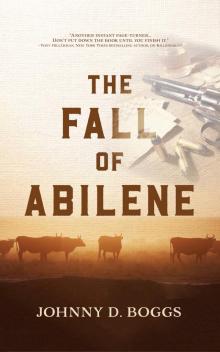 The Fall of Abilene
The Fall of Abilene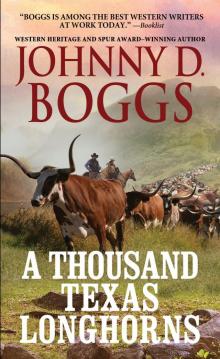 A Thousand Texas Longhorns
A Thousand Texas Longhorns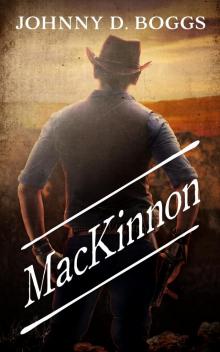 MacKinnon
MacKinnon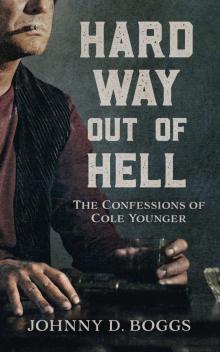 Hard Way Out of Hell
Hard Way Out of Hell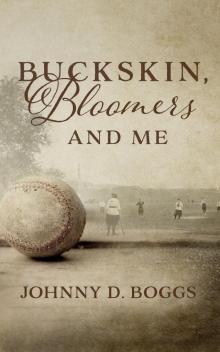 Buckskin, Bloomers, and Me
Buckskin, Bloomers, and Me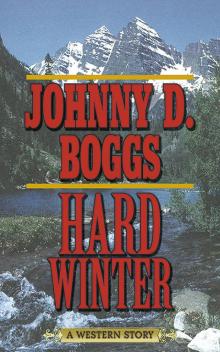 Hard Winter
Hard Winter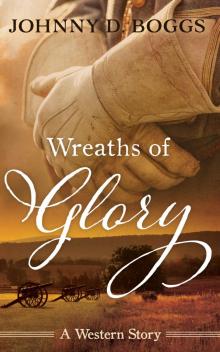 Wreaths of Glory
Wreaths of Glory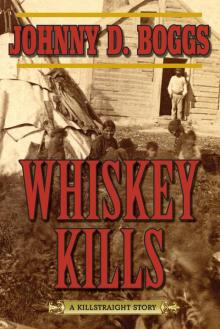 Whiskey Kills
Whiskey Kills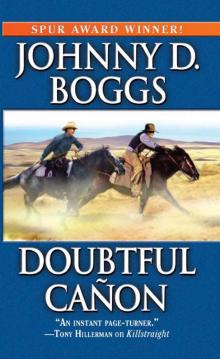 Doubtful Canon
Doubtful Canon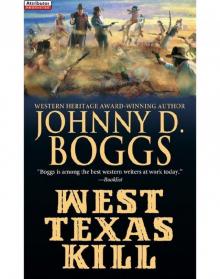 West Texas Kill
West Texas Kill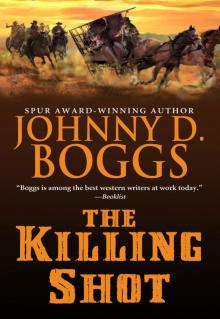 The Killing Shot
The Killing Shot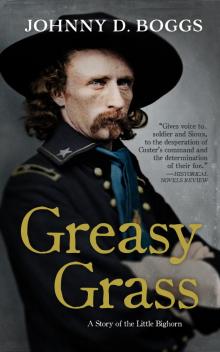 Greasy Grass
Greasy Grass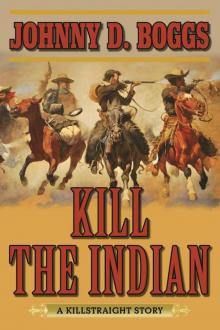 Kill the Indian
Kill the Indian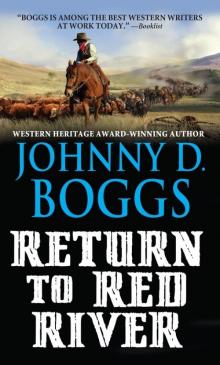 Return to Red River
Return to Red River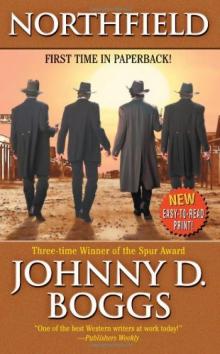 Northfield
Northfield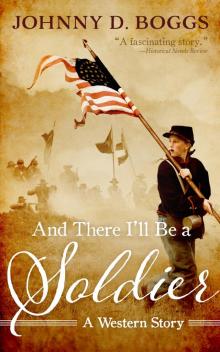 And There I’ll Be a Soldier
And There I’ll Be a Soldier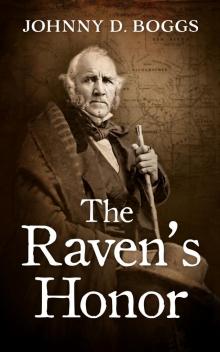 The Raven's Honor
The Raven's Honor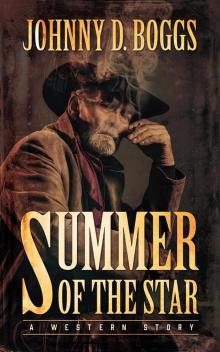 Summer of the Star
Summer of the Star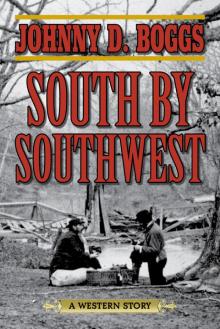 South by Southwest
South by Southwest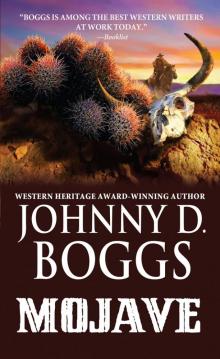 Mojave
Mojave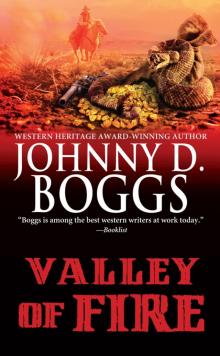 Valley of Fire
Valley of Fire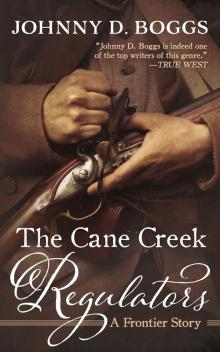 The Cane Creek Regulators
The Cane Creek Regulators